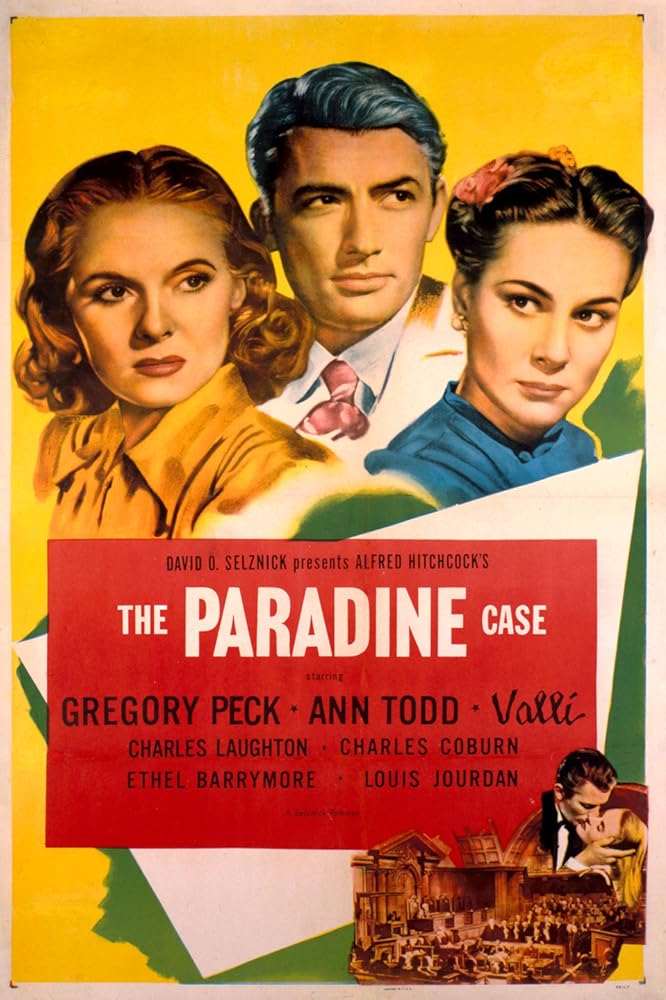
PARADINE CASE, THE
(director: Alfred Hitchcock; screenwriters: James Bridie/Ben Hecht/Alma Reville/David O. Selznick,/”from the novel by Robert Hichens; cinematographer: Lee Garmes; editor: John Faure; music: Franz Waxman/Paul Dessau; cast: Gregory Peck (Anthony Keane), Ann Todd (Gay Keane), Charles Laughton (Judge Lord Thomas Horfield), Charles Coburn (Sir Simon Flaquer), Valli (Mrs. Maddalena Anna Paradine), Joan Tetzel (Judy Flaquer), Leo G. Carroll (Sir Joseph Farrell, Counsel for the Prosecution), Ethel Barrymore (Lady Sophie Horfield), Louis Jourdan (Andre Latour), John Goldsworthy (Lakin, butler); Runtime: 115; MPAA Rating: NR; producer: David O. Selznick; Anchor Bay Entertainment; 1947)
“A film even Hitchcock didn’t care for.”
Reviewed by Dennis Schwartz
It’s based on a 1933 novel by Robert Hichens and written by James Bridie, Ben Hecht, Alma Reville and David O. Selznick. Alfred Hitchcock (“The 39 Steps”/”The Birds”/”Topaz”) directs this chatty, stodgy and unconvincing Old Bailey courtroom drama; it’s one of his few clunkers. Producer David O. Selznick signed Hitchcock to a contract seven years ago to come to LaLa land and the two never got along from the onset. This was their last pic together and they violently disagreed about everything, from the script to the casting to the production values. Since O. Selznick had more power he won all arguments, and as a result this film fails to live up to Hitchcock’s usual high standards—though the craftsmanship is still there. Hitchcock wrote the script with his wife, but O. Selznick changed it—greatly displeasing the Master. Hitchcock wanted Laurence Olivier for the lead, O. Selznick insisted on the latest hot Hollywood star Gregory Peck to play an English barrister (which didn’t work, though Peck gives it a good effort). They both wanted Ingrid Bergman or Greta Garbo for the female lead, but ended up with the unknown but promising Italian actress Valli to play the accused murderess (a part she wasn’t suited for) when both Bergman and Garbo refused the part. It turned out that this undemanding and uninvolving drama was a film even Hitchcock didn’t care for.
In 1946, the glamorous foreigner Maddalena Anna Paradine (Valli) is arrested for poisoning her much older blind wealthy husband, Colonel Richard Paradine, a British war hero of WWI. Sir Simon Flaquer (Charles Coburn), the family solicitor, retains hotshot barrister Tony Keane (Gregory Peck) to defend the accused. One visit to Holloway prison and Tony forgets about his loyal and attractive wife of eleven years, Gay (Ann Todd), and openly falls madly in love with the accused (If this bolt of love happened, it happened in the writer’s head and not onscreen). Becoming overwrought with emotion, Tony tries to pin the murder on the Canadian valet Andre Latour (Louis Jourdan) despite it being obvious that Mrs. P. was in love with the valet and is not above suspicion since she had a checkered past and was a poor girl who married to improve her station in life. Trying to establish his client’s innocence at the loyal valet’s expense, the barrister puts his reputation on the line by acting with his heart instead of his head and greatly hurts his sweet and faithful wife who knows he’s acting in this unprofessional way because he loves his client. During the courtroom testimony, the barrister is stunned to learn that he’s taken the wrong tact with his not so innocent client and has ruined the life of the deeply affected valet. Sitting on the bench is the acid-tongued Lord Horfield (Charles Laughton), who despises Tony for his over-emotional courtroom bravado.
The love affair and the courtroom dramatics were unbelievable, and the tortuously verbose script offered a lot of fuss over nothing that important. Hitchcock or not, it’s the kind of second-rate film that is easy to forget even while in the middle of watching it.
REVIEWED ON 1/7/2008 GRADE: C+